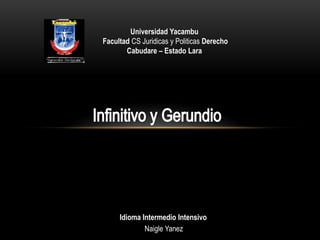
Yelena
- 1. Idioma Intermedio Intensivo Naigle Yanez Universidad Yacambu Facultad CS Juridicas y Politicas Derecho Cabudare – Estado Lara
- 2. Hay ciertas palabras en Inglés que generalmente seguidos por un infinitivo o gerundio. El inglés tiene dos tipos de sustantivos verbales, el infinitivo (con o sin "to") y el gerundio (la terminación -ing). La mayoría de los verbos que toman un sustantivo verbal pueden estar seguidos de uno u otro (un gerundio o un infinitivo, pero no ambos). Sin embargo, existen determinados verbos a los que puede seguirle indistintamente un gerundio o un infinitivo. Naigle Yanez
- 3. 1. Después de las Preposiciones. She left without kissing me. We’re thinking of going to Italy. Los verbos más frecuentes que solemos encontrar con el gerundio son: like, love, hate, enjoy, miss, feel like, mind, finish, risk, practise, put off, stop, suggest, can’t help, fancy, admit, deny, give up, imagine, keep (on), put off (postpone), spend time, can’t stand, delay, regret, avoid, consider, involve, go on (=continue) Naigle Yanez 2. Después de algunos verbos. I enjoy eating out. Do youmind giving me your address? 3. Como el sujeto de una frase. Smoking is bad for you. Skiingis expensive
- 4. 'to' + Infinitivo: 1. Para dar una respuesta a la pregunta ‘Why’ (¿por que?) Why did you stop working? - To spend more time with my children. 2. Después de los adjetivos It’s not easy to find a good man. 3. Después de algunos verbos I forgot to phone the bank. She needs to see you urgently for spend for to spend Observa los ejemplos con el negativo ‘not to’: We hope not to be in the same flat next year. She decided not to get married. Los verbos más frecuentes que solemos encontrar con 'to' + infinitivo son: would like, want, need, decide, hope, arrange, expect, plan , forget, seem, appear, wish, promise, offer, refuse, l earn, manage, afford, agree, fail, tend, happen, mea n, prepare, pretend, threaten, attempt. Naigle Yanez
- 5. GERUNDIO E INFINITIVO CUANDO LOS DOS SON POSIBLES Existen verbos con los que se puede poner el gerundio (-‘ing’) o el infinitivo con ‘to’. En algunos, el significado de la combinación de los dos verbos cambiará al poner infinitivo o gerundio. STOP - I stopped to have a beer. Se interrumpe la actividad que se está haciendo para beber una cerveza. - I have stopped drinking beer. Se interrumpe la actividad (en este caso de beber cerveza). TRY - I tried to lift the box but it was too heavy. Se intenta algo difícil que requiere esfuerzo. - Why don’t you try closing the window if the traffic is too noisy? Se intenta un experimento, test o prueba para ver si funciona. Naigle Yanez REMEMBER 1. Remember to buy milk on your way home. 2. I remember kissing my first girlfriend. NEED - I need to work harder. Tengo la obligación de hacer algo. - This room needs painting. Hay necesidad hacerlo (en voz pasiva)